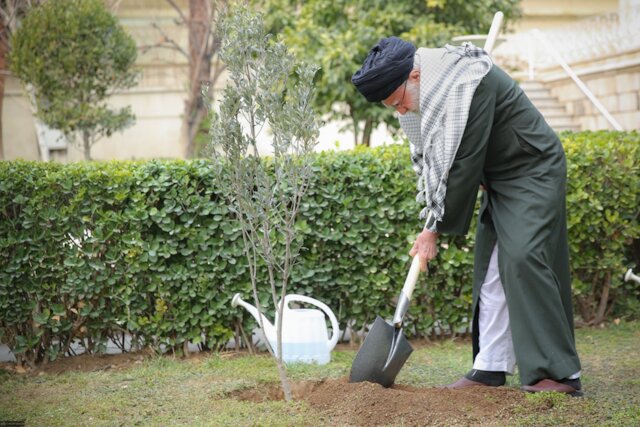Mohsen Faezi, researcher in Palestine and West Asia issues
To mark National Tree Planting Day in Iran on March 5, Imam Khamenei planted three saplings, including an olive tree. Following the olive tree planting, he expressed, "[Planting the olive tree] symbolizes our solidarity and empathy with the people of Palestine, which is the center for [the cultivation of] olives. We send our greetings from afar to these oppressed, beloved, truly resilient people. We want you to know that you are constantly in our thoughts, even as we the plant this olive tree in your honor” (March 5, 2024).

The olive tree holds profound significance as a symbol of "life" for Palestinians, a tree that has stood alongside them for centuries. Its roots are thought to originate in the Levant and Palestine, gradually spreading across the centuries to Western Asia, North Africa, Morocco, Tunisia, and eventually reaching Europe.
Olive and its tree, due to their deep historical significance, are important parts in Palestinian culture, seamlessly woven into the fabric of Palestinian women's clothing, the iconic keffiyeh, and the architectural essence of Palestinian homes. The leaves and tree of the olive stand out prominently in these cultural expressions.
Following the beginning of the Zionist occupation, the olive tree became a symbol of Palestinian resistance. Due to the Zionist regime's persistent opposition to Palestinian identity in different variations, olive trees weren't exempt from Zionist aggression. According to Mahmoud Al-Sayfi, director of the Geological Research Center in the northwest coastal region, "Zionists meticulously plan to target olive trees, akin to their military operations. Israel has destroyed over 2 million olive trees since the occupation of Palestine".
Even after the Zionist occupiers destroyed over 2 million olive trees in the last 75 years, these sturdy and resilient trees persist.
UNESCO acknowledges the historical significance of olive trees in Palestine, dating back to 5500 years ago. Consequently, since 2019, November 26th has been designated as World Olive Day annually. Currently, more than 11 million olive trees thrive in Palestine. The oldest olive tree in Palestine, located near Bethlehem in the village of Al-Walaja, near the city of Al-Quds, boasts an age exceeding 5000 years, proudly standing at a height of over 13 meters.

The rich history of the Palestinian people and their land, evident in cultural symbols like the olive tree, spans many centuries and remains both undeniable and enduring. Ayatollah Khamenei echoes this sentiment, affirming, “Palestine is not a fake country that has come into being today. Palestine has a thousand-year history. The people of Palestine are a nation. They own a land” (July 6, 2016).
(The views expressed in this article are author’s own and do not necessarily reflect those of Khamenei.ir.)






